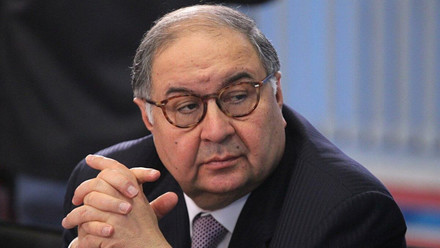Uzbekistan is lobbying the EU to lift sanctions on Alisher Usmanov and his sister as the Uzbek-Russian billionaire struggles to disentangle himself from the fallout of Moscow’s war in Ukraine, the Financial Times said.
Usmanov was one of 26 Russians sanctioned by the EU in the immediate days following Vladimir Putin’s full-scale invasion of Ukraine in February, with the bloc claiming he was one of the Russian president’s “favourite oligarchs”.
His sister Gulbakhor Ismailova was also sanctioned on the grounds that she was the legal owner(opens a new window) of some of Usmanov’s assets, such as his $600mn yacht “Dilbar”.
Tashkent has used recent meetings between Uzbek and EU officials to raise concerns about the sanctions, according to two people with knowledge of the discussions. The central Asian country is also providing legal assistance to Usmanov for a potential court challenge against Brussels if the bloc rejects the requests to have the restrictions lifted.
Usmanov, who was worth about $20bn before Putin’s invasion, has maintained his close connections with Uzbekistan, where he was born. Tashkent has argued that the sanctions against him, which include an asset freeze and travel ban, have restricted the billionaire’s ability to invest some of his fortune in the country.
The foreign ministry of Uzbekistan did not respond to requests for comment. A spokesperson for Usmanov said: “We cannot comment on the actions of the Uzbek government, but sanctions are indeed hampering investment and charity projects.”
Usmanov, 69, started making his fortune while a senior director at Russian state gas company Gazprom in the 1990s, leveraging that role to build an industrial conglomerate involved in steel, copper, telecoms, technology and media.
Both Usmanov and Ismailova have lodged official appeals against the EU restrictions, alongside more than a dozen other Russian oligarchs.
The lobbying from Tashkent comes at a time when the EU is seeking to build closer ties with Uzbekistan and other central Asian countries as the region reassesses its relationship with Russia in light of the war in Ukraine.
But any move to lift sanctions against Usmanov and Ismailova, which would require unanimous approval by all 27 EU members, would potentially open up similar debates about dozens of other dual national Russian oligarchs subject to sanctions, multiple EU officials told the Financial Times.
“Mr Usmanov has reportedly fronted for President Putin and solved his business problems,” the EU wrote in its initial justification for sanctioning the businessman on February 28. “Therefore he actively supported materially or financially Russian decision makers responsible for the annexation of Crimea and the destabilisation of Ukraine.”
A spokesperson for the European Commission said it does not comment on meetings between the bloc and third countries, and discussions on sanctions issues were confidential.
“The EU sanctions regime provides for all listed individuals and entities a possibility to legally challenge the listing at the European Court of Justice,” said Peter Stano, lead spokesperson for foreign affairs and security policy.
German police on Tuesday raided offices of Swiss bank UBS in Frankfurt and Munich in connection with a money laundering investigation into Usmanov. A spokesperson for Usmanov “categorically” rejected any allegations of money laundering or tax evasion on his part.
The 156-metre-long “Dilbar” — the world’s biggest superyacht — was detained by Germany in March, days after the sanctions were imposed. Properties linked to Usmanov in Germany were raided by police in September.
Usmanov’s other sister Saodat Narzieva was removed from the EU’s sanctions list in September after successfully appealing against what her representatives said were decisions “based on false accusations”.
The EU initially justified its sanctions against Narzieva on reports by the Guardian newspaper and the Organized Crime and Corruption Reporting Project citing what they claimed were documents connecting her to bank accounts linked to Usmanov.
The bloc also fears that detailed examinations of individual sanctions could spark a debate on the overall legality of its decision to punish business people for Putin’s war and on the supporting evidence it has provided to justify the sanctions.















